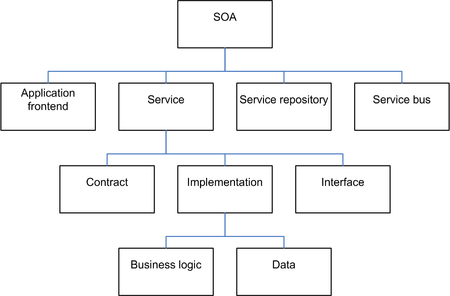http://en.wikipedia.org/wiki/Service-oriented_architecture
...

Elements of SOA, by Dirk Krafzig, Karl Banke, and Dirk Slama[16]
These services inter-operate based on a formal definition (or contract, e.g., WSDL) that is independent of the underlying platform and programming language. The interface definition hides the implementation of the language-specific service. SOA-based systems can therefore function independently of development technologies and platforms (such as Java, .NET, etc.). Services written in C# running on .NET platforms and services written in Java running on Java EE platforms, for example, can both be consumed by a common composite application (or client). Applications running on either platform can also consume services running on the other as web services that facilitate reuse. Managed environments can also wrap COBOL legacy systems and present them as software services. This has extended the useful life of many core legacy systems indefinitely[citation needed], no matter what language they originally used. SOA can support integration and consolidation activities within complex enterprise systems, but SOA does not specify or provide a methodology or framework for documenting capabilities or services.
High-level languages such as BPEL and specifications such as WS-CDL and WS-Coordination extend the service concept by providing a method of defining and supporting orchestration of fine-grained services into more coarse-grained business services, which architects can in turn incorporate into workflows and business processes implemented in composite applications or portals[citation needed].
As of 2008 researchers have started investigating the use of service component architecture (SCA) to implement SOA.
....





 LibreOffice
LibreOffice Firefox
Firefox
No comments:
Post a Comment